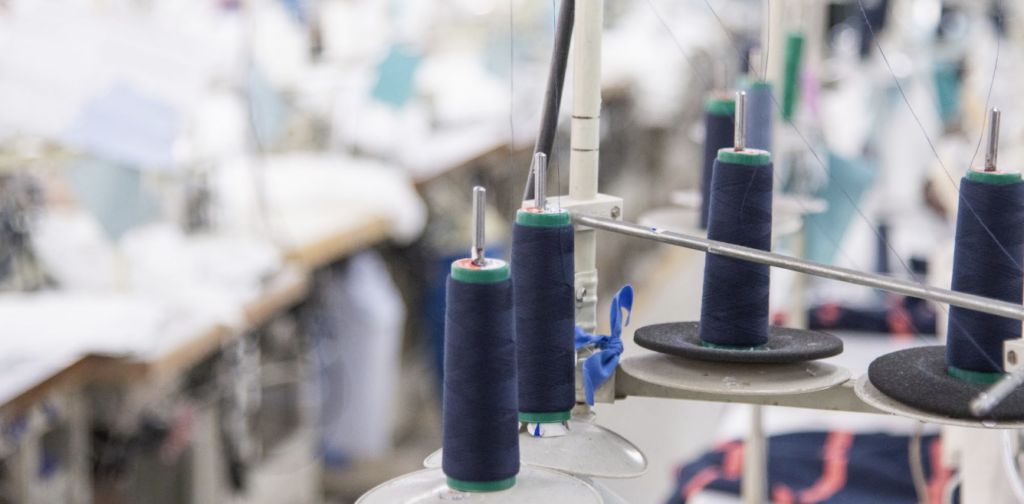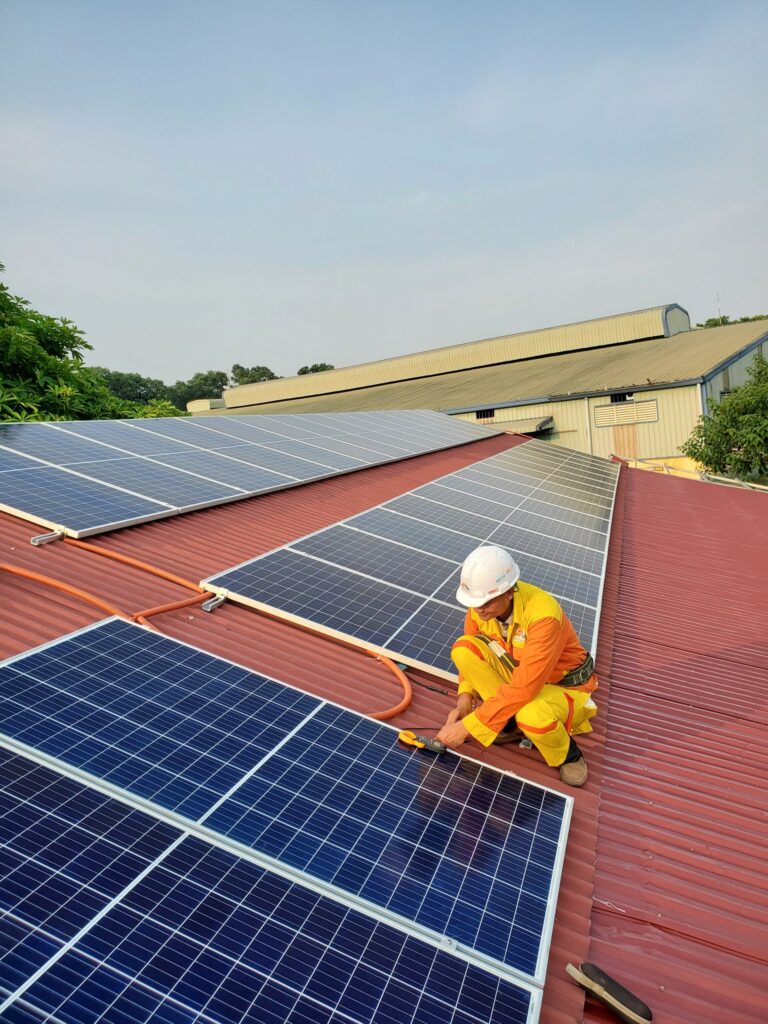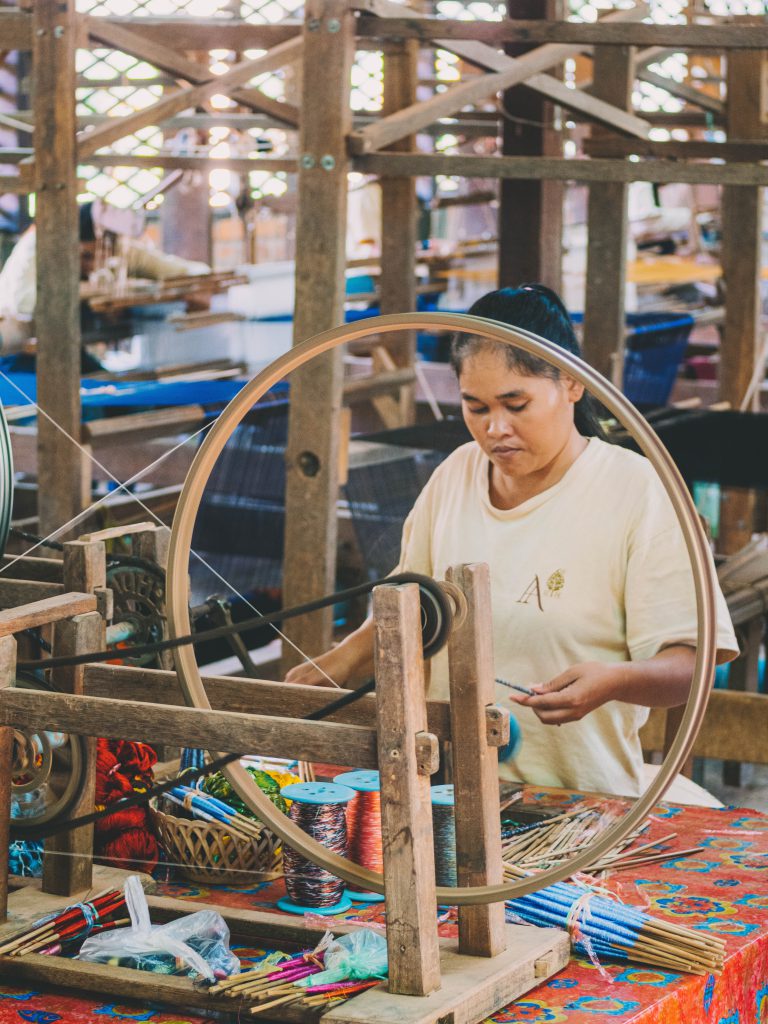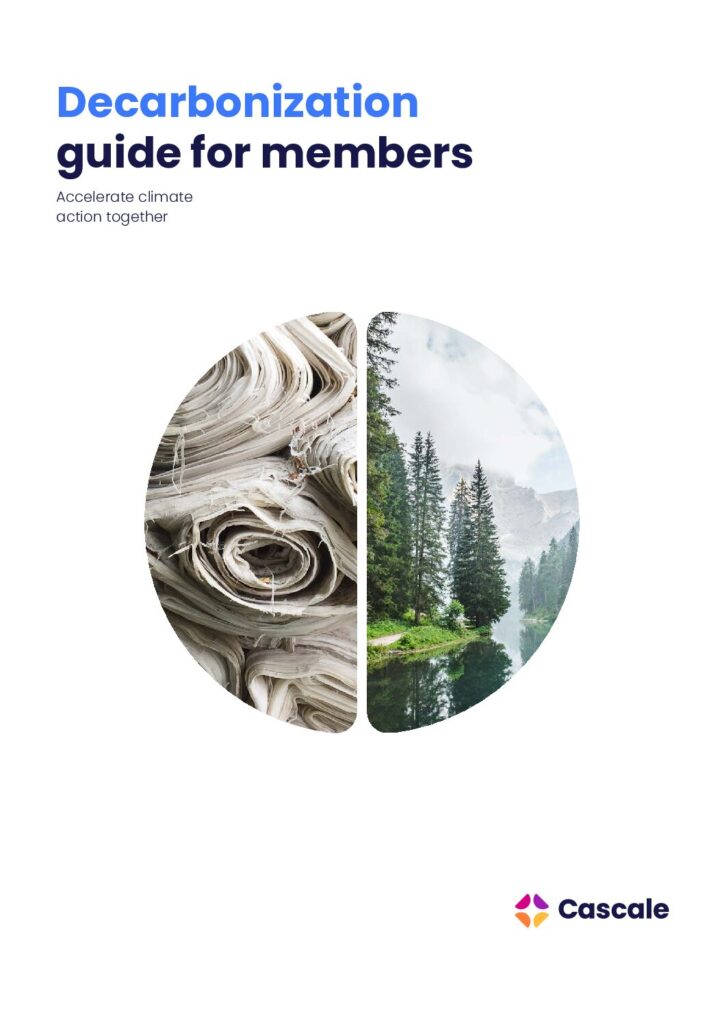
Dear Fashion: Let’s Step Up and Get Aligned
In a recent opinion editorial with WWD, CEO Colin Browne argues fashion needs to take more serious and coordinated action on sustainability. Read the highlights here!
Joyce Tsoi, senior director of the Decarbonization Program at Cascale, joined a panel on “Sustainability and Finance in the World of Textiles” at the ITMAconnect Innovator Xchange Virtual Edition last month.

Joyce Tsoi, senior director of the Decarbonization Program at Cascale, joined a panel on “Sustainability and Finance in the World of Textiles” at the ITMAconnect Innovator Xchange Virtual Edition last month.
Moderated by Jeroen Vits, managing director of ITMA Services, Brussels, the panel also included Ryan Gaines, chief financial officer of Apparel Impact Institute, a Cascale partner, and Michael Rattinger, senior climate change specialist at Asian Development Bank.
Designed to offer perspective and insights on the intersection between sustainability and finance in the global textile supply chain, the panelists discussed sustainability requirements set by global brands and retailers and their impact on the global textile supply chain. Participants also shed light on financial instruments for the textile industry to realize its sustainable transformation demanded by many stakeholders.
Tsoi shared that ITMA is well positioned to weigh in on the transformations in the supply chain, a subject on which Cascale and collaborators are increasingly focused. She detailed how Aii and Cascale formed a strategic partnership in 2023 in order to expand impact and scale the collective knowledge base. Then stakeholders can align on funding, decision-making, and ultimately, accelerate action. For Aii, this chiefly involves Fashion Climate Fund and Climate Solutions Portfolio, which is meant to accelerate action and drive emissions reduction. Cascale’s focus is the Decarbonization Program and corresponding science-aligned targets (SATs) adoption, part of Cascale’s growing program base that is guided by the organization’s “Evolution for Impact” strategy.
With more than 300 members worldwide – including brands and retailers, manufacturers, and affiliate members – Tsoi shared that Cascale effectively represents half of the apparel, textiles, and footwear industry, in terms of revenue. She recommended brands and retailers utilize the Higg Index suite of tools and nominate their suppliers to participate in programs to improve energy efficiency and/or adopt solar rooftops at the facility level. Tsoi advised that brands communicate their climate goals and targets clearly with their suppliers and build deeper engagement on decarbonization intervention projects. These included coal phase out, optimizing energy efficiencies in production, and transitioning to low-carbon or renewable energy fuels or technologies. Overall, she said, the sector needs to realize significant decarbonization efforts in order to keep the global temperature rise within the 1.5-degree Celsius limit by 2030.
Finally, Tsoi shared a promising outlook for textile recycling, which can help to conserve resources in textile production and improve efficiencies. She called for the continued investment in developing these advanced technologies and infrastructure to boost the collection, sorting, and processing of textile waste, as well as research and development of using innovative materials.

Cascale (formerly the Sustainable Apparel Coalition) collaborated with Fashion Charter Decarbonization Working Group members on the UN Fashion for Climate Report, Guidance for Measuring Greenhouse Gas Emissions for Purchased Goods and Services in the Apparel and Footwear Industry. Prior to this publication, there was no sector-specific guidance on how to calculate carbon emissions in the upstream supply chain, a complicated process that requires blending factory-specific data when available and industry averages elsewhere. This report provides the industry with technical guidance that will enhance the consistency, accuracy, and comparability of carbon emissions calculations. The work reflects Cascale’s organizational focus on collaboration to drive emissions reduction in the apparel and wider consumer goods industry.
Collaborating with the UN Climate Change-convened Fashion Industry Charter for Climate Action (Fashion Charter) and with members of its Decarbonization Working Group, Cascale led the development of guidance specific to measuring category 1 of Scope 3: Purchased Goods and Services (PG&S), which represents the vast majority of a fashion company’s carbon footprint. To develop the initial report, the organization received input from over a dozen brands, manufacturers, consultancies, and other industry stakeholders. After a draft review, Cascale incorporated feedback into the final report, with support from UNFCCC.
For apparel and footwear brands and retailers, PG&S emissions result from all of the value chain activities that go into making finished products, from raw materials to fabric development to product manufacturing. Given the magnitude of PG&S for brands and retailers, the language in this report is generally tailored for them; however, the guidance can also be used by finished goods manufacturers, textile manufacturers, and other “upstream” companies to measure their PG&S emissions.
Cascale drives impact at scale through three foundational pillars — Combat Climate Change, Decent Work for All, and Nature Positive Future — forming a unified strategy for industry transformation through collective action programs that guide members from action to impact. Cascale’s Decarbonization Program, launched in 2022, is one leading example of these programs in action. It aims for members to achieve a 45 percent reduction in greenhouse gas (GHG) emissions by 2030. As of 2023, Cascale’s corporate members are required to set science-based targets (SBTs) for reducing GHG emissions by the end of 2023, when the organization launched the Manufacturer Climate Action Program (MCAP), over 50 percent of these members had set or committed to setting SBTs. To learn more about participating in this program, please complete the MCAP Expression of Interest form. To learn more about this report, please contact higgindex@cascale.org.

As part of a recurring series, SAC details the involvement and vision of its Board members. Here, Delman Lee, vice chair of Tal Apparel Limited.
Few have been involved from the start but SAC founding member TAL Apparel Limited has seen the organization through a trajectory of changes, including the recent CEO transition and upcoming rebrand. For Delman Lee, vice chair of TAL Apparel Limited, the apparel industry is family matters. He’s a third-generation apparel manufacturer, though despite his notoriety in the industry he also boasts a doctorate from the University of Oxford and a bachelor’s in electrical engineering.
His reflections are summarized in an interview with the SAC.
SAC: How long have you been involved with the SAC?
Delman Lee: Since the beginning; TAL is one of the founding members. We were invited to join by Levi’s. At that time, the annual meeting had three tables. I’ve been involved since the outset, well past a decade now.
SAC: What about the Board?
D.L.: This is my second term. So, it will be three and a half years.
SAC: It seems you really understand the technical nature of supply chains, but have you always considered yourself a sustainability advocate?
D.L.: No, I have not. I was and am an electrical engineer. I spent many years doing research before coming back to the family business. And once I got involved in the business, very early on, I took up the responsibility of looking after [corporate social responsibility] CSR.
I got into sustainability while trying to build a responsible company. That word ‘responsibility’ has transpired into different names. It was CSR at that time, and sustainability now. Because it’s a labor intensive business, there are a lot of social issues. But soon, the environmental challenge came up. At that time I was looking for a framework or language to talk about environmental sustainability and then SAC popped up.
It’s interesting, before Levi’s called me, we heard there was a group formed by some big brands. Patagonia was working on something, and we were wondering who [else] they were. I was very happy that I actually got a call because we were looking for something to unify the way we talk about sustainability, and in particular, environmental [aspects] at that time.
SAC: It’s nice to hear there was a pre-competitive need and collaboration to do something about it. Do you feel like your sustainability aims for Tal have changed over time, and what are they now?
D.L.: TAL has also evolved in the time I’ve been there. We’ve always been a company who cares about the workers and the environment. Sustainability was already what we call ‘value drivers’ of the company. When we did the three-year plan [a decade ago], there were eight value drivers: profit, sales, innovation, employee engagement, the usual stuff, but sustainability was one of the eight, in all three year plans.
More recently it has evolved in our latest strategy review. We changed the purpose of the company to be: “To lead change in how the world sustainably clothes itself.” Sustainability has changed from one of the eight company value drivers to be the long-standing purpose of the company, three years ago.
SAC: And similarly, what about for the SAC, and maybe the broader industry?
D.L.: I think the aims are the same but the tasks are still enormous. To change an industry by collaborating amongst the peers in the supply chain is a difficult one.
SAC: Because the SAC represents over half the textile and apparel industry, it really reflects the kind of progress and pain points of sustainability progress. Where do you see more room for growth and improvement?
D.L.: It has made a lot of progress over the past decade. They built the [Higg Index] tools through the many collaborations with all of the members – whether you are a supplier or a brand or retailer. There are a lot of passionate folks working on all the details of the tools.
The tools and measurements are there, and we are more or less unified in the way we talk about environmental sustainability. On the social side, we are halfway there with Higg Facility Social & Labor Module (FSLM) or Social and Labour Convergence Program (SLCP).
People begin to ask, “Where’s the impact?” Collective action is one of our strategic pillars and approaches on how we use the tools to reflect how things are being done. But really, people need to get onto actions, in particular, for decarbonization because the deadline is coming very quickly for 2030.

TAL Apparel
SAC: Why are manufacturers interested in the SAC?
D.L.: As a manufacturer, we don’t participate in many multi-stakeholder initiatives because we’re a small team, and there are a lot of multi-stakeholder initiatives.
There are two reasons. Even right at the outset, the SAC’s approach to driving change was impressive. On the technical side, even 12 or 14 years ago, they introduced the idea of facility, environmental performance, product performance, and brand performance. There are multi-dimensions of sustainability, and this is a technical aspect that was pretty comprehensive at the time. And then the second reason is they involve partners across the supply chain. Manufacturers are actually at those tables. There are manufacturers talking about how to make the change.
A lot of multi-stakeholder initiatives are usually initiated by brands and retailers. Manufacturers are told to do something, or rarely consulted. A lot of the social and environmental issues are in the plant, so it’s always good to involve the people doing the change in the discussion about change.
We call this an equal partnership principle which has been instilled in SAC from the beginning, and that’s why you see a third of the board comprises brands and retailers, a third is manufacturers, and a third is affiliates. It’s in the governance model. That’s why it’s made so much progress and why it appeals to manufacturers to be part of this coalition.
SAC: How can the SAC, governments, NGOs, etc., support manufacturers more?
D.L.: For climate change, or even for social change, we do need a lot of players. NGOs, pressure groups, and coalitions like the SAC, to help bring people together and bring awareness to the issues.
For me, regulation, in particular on the environmental side, is one of the last levers for change in an industry or in a society, not just our industry but for many industries.
With regulation coming in, governments are beginning to put a price on decarbonization or forced labor. I think it’s a bit unfortunate that the private sector can’t do it by themselves but the private sector and pressure groups can get things going. That’s how big the change is, and not just for our industry. COP29, the United Nations, everyone has to get involved in this particular change.
SAC: What is essential in driving lasting change?
D.L.: A lot of work. The crux of one of the major problems, or the elephant in the room, is who is paying for it? The economic question has to be addressed somehow by someone. And progressive manufacturers may know this will just be the entry ticket to continue to play in this area.
But unfortunately, not everyone in the industry thinks like that. Some people think, “Maybe I can still be a little bit slower on this journey and still get away with it.”This doesn’t just apply to manufacturing, brands and retailers have the same issue, and in the end it ties to the consumer, as well.
If consumers aren’t paying with their pocket, buying or preferring brands that are sustainable, then it drives the behaviors of the brands. If a consumer doesn’t demand it or only certain section demands it, then it’s really not enough.
SAC: Who is involved in this?
D.L.: Now, to get something done. If you map out decarbonization, most of the footprint is actually in the fabric mill. So the fabric mill can make all the changes and can phase out coal if they want, but all that comes with a cost. It’s very simple. They may have just installed some machine that is coal based, how do they transition out of it?
At the end of the day, it is a cost-related issue. It requires some time commitment from the garment manufacturer, and the brands collectively agreeing to a long-term agreement because we’re still in a market economy. Some commitment of orders or long-term commercial agreement would help them to make that capital investment for change. If there is government or foundation funding that helps drive that – great. The industry is big, so you can’t only rely on philanthropic funding for that change. It’s really a combination of everything.
The financial market is also going through a sea change where they have to support the transition, as well. That’s just the commercial side, the other side is linked to the country, or the government of a particular country. So progressive brands, retailers or manufacturers can only progress so far. In Vietnam, for example, where we are based, even if we put solar panels on top of all my roofs, I will not hit my science-based target. It has to rely on off-site solar. And for off-site solar, the regulations are not clear. It depends on the Vietnamese government to allow a commercial entity to come in to set up off-site solar to basically decarbonize the grid. The decarbonization of the grid that we rely on is also part of the journey and that shows the country-level politics.
SAC: What is the single most important issue dividing the industry?
D.L.: It’s really, collectively, to have a mindset that we can do it. You just heard my story, it is multi-dimensional. It’s not just the brand committing to a manufacturer and the fabric mill; it’s the consumer, it’s the country you’re operating in, and it’s the wider energy transition. The whole thing is quite complex. We can work on the apparel-specific stuff: sustainable fibers, recycling, circular fashion, circular economy, but 2030 is only six years away, right? Six years can go by very fast.

Joyce Tsoi, SAC director of Collective Action, co-hosted an in-person and virtual meetings in Vietnam and Cambodia to kick off the SAC x Project Development Programme (PDP), which aims to develop and scale rooftop solar photovoltaic project(s) to manufacturing facilities in Vietnam and Cambodia. Implemented by Deutsche Gesellschaft für Internationale Zusammenarbeit (GIZ) GmbH, the Project Development Programme (PDP) is an integral part of the German Energy Solutions Initiative. Coordinated and financed by the German Federal Ministry for Economic Affairs and Climate Action (BMWK) it aims to globalise German and European technologies and expertise in climate-friendly energy solutions. The PDP combines development cooperation with private-sector engagement to foster partnerships between local businesses and trusted providers of climate-friendly energy solutions, creating mutually beneficial outcomes and advancing the energy transition in its cooperation countries. Simultaneously, German and European providers benefit by easing their market entry into developing and emerging countries.
In Vietnam, the meeting also included a presentation from Eunice Doan, energy advisor and Country Representative of PDP Vietnam, and Lucia Hoang, regional manager of CSR Southeast Asia for Bureau Veritas, a world leader in laboratory testing, inspection, and assessment services. In Cambodia, presenters included Vabotra Chea, Technical Advisor and Country Representative of PDP Cambodia, and Rijan Shrestha, Technical Advisor and Country Manager of PDP Cambodia.
At both meetings, Tsoi shared information about the SAC’s Collective Action team, which oversees the development of its Decarbonization Program in support of the organization’s goals to achieve a 45 percent greenhouse gas (GHG) emission reduction in line with science-based targets (SBTs) by 2030 — and to zero by 2050. The SAC launched the Decarbonization Program in 2022 and integrated SBTs into SAC’s membership requirements in 2023, with over 50 percent of members having taken this action to date. “We believe that this is the most credible and ambitious approach, backed by the latest climate science,” Tsoi said. “SBTs have become fundamental expectations for companies globally in multiple industries and we want to enable our industry towards a low carbon transition by shifting from heavily fossil fuels use to adopting renewables or low carbon sources.
To achieve these goals, the SAC partnered with Textile Exchange and Zero Discharge of Hazardous Chemicals (ZDHC) to form the Apparel Impact Institute (Aii), creating a connected, end-to-end path to action for the entire apparel and footwear industry. The Collective Action team is committed to activate the SAC’s ecosystem for action and announced the launch of the Manufacturer Climate Action Program (MCAP) in September of this year. Designed in collaboration with NIKE and Target Corporation, the MCAP is a critical component of the SAC’s Decarbonization Program efforts to catalyze support and drive the sector toward ambitious yet necessary CO2 emissions reductions. Tsoi also shared the four key elements that form the core of MCAP, empowering manufacturers to define their scope 1 and 2 science-aligned targets, immediately take critical action to reduce their direct and indirect emissions and improve operational efficiency in order to advance industry goals.
During the Vietnam meeting, Tsoi used data accessed through the SAC’s Higg Facility Environmental Module tool in order to break down the mix of energy sources at manufacturing sites both globally and in Vietnam; the use case illuminated the sector’s dependence on fossil fuels. Over 80% of energy usage in 1253 facilities in Vietnam are from fossil fuels. Only 12.4% of energy comes from renewable energy sources. She also shared data on renewable energy adoption around the globe and was able to show Vietnam is a progressive country to increase its renewable energy capacity to sustain the growth of its industries. Following Tsoi’s presentation, Hoang shared the service offerings of Bureau Veritas Vietnam, which can support manufacturers in conducting life cycle assessments (LCAs), performing energy diagnosis services and consulting for GHG calculation and setting SBTs. Doan then explained the support and services offered to facilities by PDP, which guides facilities through the development process of solar PV technology and the selection of system size; service provider, equipment, and best investment scenario. These include technical evaluation, investment appraisal development, solar power implementation, and introduction to financing opportunities with preferential loan interest rates.
At the Cambodia meeting, Vabotra explained that with an average daily solar radiation of 5 kWh/m2 and average sunshine of 8 hours per day, Cambodia is one of the Southeast Asia countries that has high solar potential. He also discussed the regulatory landscape in terms of the history of Cambodia’s solar development, options to deploy renewables based on the Ministry of Mines and Energy (MME)’s updated principles of permitting the use of rooftop solar power. Rijan followed with an explanation of how the PDP team can support manufacturers in technical evaluation, investment proposals, and project implementation.

The Sustainable Apparel Coalition hosted a series of webinars to introduce the Manufacturer Climate Action Program (MCAP) to members located in Asia, North, Central, and South America (AMER) and Europe, the Middle East, and Africa (EMEA). The focus was to introduce MCAP as an integral part of SAC Decarbonization Program for SAC members and non-members alike, with a primary objective to accelerate the adoption of science-aligned targets for Scope 1 and 2 emissions, as well as to highlight the SAC’s strategic partnership with Aii’s Carbon Leadership Program (CLP).
Joyce Tsoi, SAC director of Collective Action, APAC, hosted the webinar, and introduced Ringo Yu, the new MCAP manager. Presenters also included Andres Bragagnini, manager of stakeholder engagement and Tamara Wulf, vice president of programs at the Apparel Impact Institute (Aii) and member of the apparel alliance, which the SAC formed in partnership with Textile Exchange and Zero Discharge of Hazardous Chemicals (ZDHC) to create a connected, end-to-end path to action for the entire apparel and footwear industry.
Yu shared information about the SAC’s Collective Action team, which oversees the development of its Decarbonization Program in support of the organization’s goals to achieve a 45 percent greenhouse gas (GHG) emission reduction in line with science-based targets (SBTs) by 2030 — and to zero by 2050. The SAC launched the Decarbonization Program in 2022 and integrated SBTs into SAC’s membership requirements in 2023, with over 50 percent of members having taken this action to date.
In September of this year, the SAC announced the launch of the Manufacturer Climate Action Program (MCAP). Designed in collaboration with NIKE and Target Corporation, the MCAP is a critical component of the SAC’s Decarbonization Program, designed to catalyze support and drive the sector toward ambitious yet necessary CO2 emissions reductions.
Tsoi shared the four key elements that form the core of MCAP, empowering manufacturers to take critical action to set science-aligned targets, reduce emissions and improve operational efficiency in order to advance industry goals. Then Bragagnini and Wulf detailed Aii’s Carbon Leadership Program, which can help manufacturers develop and implement a factory-level implementation plan by using Aii’s factory-level carbon toolkit, impact measurement, and validation to achieve their carbon reduction targets. They also shared details of Aii’s program portfolio. The portfolio covers a range of impact programs focused on achieving actual CO2e reductions through energy efficiency and the transition to renewable energy and away from fossil fuels. Finally, Tsoi encouraged SAC brands and manufacturer members to sign up and participate in MCAP from Q1 2024, and Aii invited the factories to participate in their programming.

Kaley Roshitsh, SAC editorial director, attended the Sourcing Journal Fall Summit for a deep dive into sourcing, as the pinnacle holiday sales season approaches. The event convened executives across sustainability disciplines for sessions on the politics of trade, managing volatility in supply chains, benchmarking and scaling circularity while securing garment provenance, among others.
Circularity Definition “Disconnect”
At the conference, presentations underscored the fact that circularity is still top of mind – but circularity awareness is lagging despite perceived momentum, according to a 2023 circularity survey from Cotton Incorporated and Sourcing Journal. Melissa Bastos, director of corporate strategy and insights at Cotton Inc., reported findings of an “industry disconnect” and “a lot of confusion” around circular fashion. Per the survey, some 55 percent of consumer respondents were “unsure” of circularity’s meaning yet 40 percent were also “interested” in repair, resale and circular clothing avenues.
Meanwhile, 84 percent of industry executives said circularity influences design choices, and 69 percent reported interest in donating old products to be upcycled into housing insulation – the objective of Cotton Inc.’s “Blue Jeans Go Green” circularity program. Cotton Inc., along with Better Cotton, Cotton Connect, and the U.S. Cotton Trust Protocol are members of the Sustainable Apparel Coalition.
Manufacturer-First Focus
Manufacturing challenges were also a hot topic. “There is a gap in the market between what is demanded and what is required,” said Ebru Debbag, executive director-global sales and marketing at Soorty Enterprises Pvt. Ltd., in a session on supply chain volatility. She called for a stronger leadership proposition to prioritize suppliers in the decarbonization journey. According to Debbag, the company set their science-based emissions target of 54 percent, and aligned it with a transition to organic cotton.
Throughout the day, panelists agreed that suppliers are challenged by the costs of decarbonization. “We can’t go green if we’re in the red,” said Jasmin Malik Chua, sourcing and labor editor at Sourcing Journal, quoting a separate conversation with a manufacturer source.
Compliance, Provenance of Growing Concern
At a panel on compliance, speakers agreed that transparency is paramount to sustainable fashion brands. “The amount of visibility that is expected is only increasing,” said Marissa Brock, director, marketing and policy at Sourcemap, who was joined by executive panelists from Supima, Oritain and Alice & Olivia. Buxton Midyette, vice president marketing and promotions at Supima, said tracing Supima fibers, and fibers generally, is a “longstanding challenge,” and not one without its costs. Supima depends on 300 family farms in the U.S. for their fiber, and all hold a vested interest in identifying and tracing their cotton fibers in depth.
Ben Tomkins, vice president of retail sales at Oritain, added there is a “superficial level of compliance on supplier declarations,” which highlights the need for alignment at the ground level so suppliers aren’t stuck with duplicate audits.
In a separate conversation about textile recycling, Bryan Timm, Recover’s chief strategy officer, explained the company’s ongoing partnership with Oritain to identify cotton waste streams. “[The] Holy grail is to recycle the clothes you’re wearing, [and the] only way to do that is design with circularity,” Timm said. He also noted that the policy gaps around circular fashion are multifold but relevant to both Democrat and Republican lawmakers, who see the U.S. Uyghur Forced Labor Prevention Act (UFLPA) as “100 percent bipartisan.” However, he emphasized, “as a supplier, you have to be responsible for what happens in your supply chain.”

Joyce Tsoi, SAC’s Director of Collective Action Programs, participated in a conversation on “Making Carbon Finance Projects Work for Farmers” at the recent Better Cotton Conference. In addition to Tsoi, speakers included Maria Kjaer, Sustainable Livelihoods Manager for Better Cotton, Amelia Sidumo, Senior Regional Coordinator for Better Cotton, and Thomas Blackburn, Head of Business Development & Partnerships at SustainCERT.
At the conference, participants discussed the potential of carbon finance projects in the agricultural sector, with a specific focus on cotton production and how the industry can collaborate with farmers on successful projects.
Cotton producers face critical challenges related to climate change, including impacted germination and yield, deteriorating quality, and increased labor costs — to name a few. Because cotton farming communities can vary greatly in size and most reflect an extensive network of cooperatives, associations, and agribusinesses, organization of coordinated responses to these challenges can also be difficult.
However, collective action through data-backed solutions such as carbon financing can help build more resilient cotton farming communities and mitigate potential future damage to farming systems posed by extreme weather events such as droughts and floods.
To make these projects work, speakers explained, stakeholders must leverage expertise and data, as well as direct or indirect relationships with farming communities, to inform decision making on purchasing and investments.
Speakers highlighted the need to move quickly on smart legislation, rather than delay in anticipation of a definitive data set. They also defined the need for traceability and verifiable data when setting climate mitigation targets and GHG accounting to meet regulatory compliance requirements, while acknowledging the complexity of communicating with consumers.
They discussed how the industry can collaborate on collective action with workers, such as developing insurance policies for climate adaptation, engaging the technology sector on improved mechanization for intercropping, improving conventional production, or supporting a just transition to organic and regenerative farming methods. Sharing costs for accessing and sharing data could involve roles for capital markets and governments.
Solutions raised included alternative irrigation systems, solar energy, and circular innovations to reduce carbon emissions, all of which have the potential to reduce overall costs, diversify incomes, and unlock access to premium markets. Finally, the speakers highlighted the potential impact on worker wellbeing, as well as ways that these projects could be designed to respect communities, such as trainings in local languages, technical capacity building, and including female workers.
The conference was well facilitated, with good Global South representation and room for diverse angles on solutions — such as analysis of whether and to what extent decreased production might be considered alongside climate adaptive practices. Speakers agreed that the need for primary data was paramount, and that traceability and impact measurement is critical in developing solutions. They were reminded to continually look outside of specific industries, learn from each other’s experiences, and share progress collectively to inspire others to take action.

New guide supports the textile and apparel industry in committing to science-based targets and delivering against validated SBTs
San Francisco, Amsterdam, Hong Kong – March 06, 2023: The Sustainable Apparel Coalition (SAC), as an impact-driven global convener of around half of the apparel and footwear industry, today launches its Decarbonization Guide for Members. The Guide is part of the SAC’s Decarbonization Program, launched last year, to drive science-based targets (SBTs) adoption and reduction in emissions across the textile and apparel industry. The Guide provides a six-step process by which organizations can commit and set SBTs and develop action plans to deliver individual targets.
Responsible for between two and eight percent of annual global greenhouse gas (GHG) emissions, the textile and apparel industry must ramp up its efforts on facilitating collective action across the industry, to deliver the 45 percent reduction needed by 2030 to limit global warming to 1.5°C. As part of the guidance provided, organizations will need to obtain internal buy-in to commit to and set SBTs, and submit their targets for verification. Once approved, member organizations will be required by the SAC to communicate their targets within six months of approval, develop an action plan and start taking actions geared towards delivering on carbon reductions. The SAC will require its corporate members to set near-term emission reduction targets in line with the latest climate science within 24 months and obtain the appropriate validation from SBTi or a third-party accredited organization.
Featuring comprehensive guidance and resources to help organizations set and achieve their SBTs in each step, the Guide forms part of the ongoing work between the SAC and its members, including best-practice sharing webinars and peer-to-peer learning sessions, in an effort to scale up collaborative solutions to address the climate crisis. Developed last year in collaboration with Michael Sadowski, one of the primary authors of the Apparel and Footwear Sector Science-Based Targets Guidance by the World Resources Institute (WRI) in 2019, the SAC has been working on refining the guidance and conducting peer-to-peer group meetings with members to understand their needs and expectations.
Amina Razvi, Chief Executive Officer at the Sustainable Apparel Coalition, said: “Right now, the textile and apparel industry is not on track to hit net zero by 2050. We need urgent transformation and increased collaboration across the industry to tackle the worst impacts of climate change. The launch of our Decarbonization Guide is a major step in our efforts to create an aligned pathway for the industry to reduce GHG emissions. We believe through continued collaboration and partnership with organizations such as the Science Based Targets initiative, we can support our members to commit and set their science-based targets and work collectively to deliver on emissions reduction targets.”
Joyce Tsoi, Director of Collective Action Programs, at the Sustainable Apparel Coalition, said: “Through the Decarbonization Program, we are enabling collaboration between brands and manufacturers to address one of the biggest challenges the industry faces: how to reach net zero. With the textile and apparel industry being so far away from reaching net zero by 2050, the need for urgent action has never been greater. This Guide is a critical marker on that journey and will empower member organizations to turn purpose into practice to deliver necessary impacts, starting from understanding and adopting targets in line with the best available science to developing action plans to take collective actions. 77% of our members participating in our decarbonization program told us that they want to share knowledge, resources and tools that are available to them to set science-based targets is their biggest priority. By giving the industry the guidance, tools and platform it needs to change, brands and manufacturers are equipped to tackle the urgent challenge of emission reductions and drive systemic change across the industry.”
Luiz Amaral, CEO of the Science Based Targets initiative (SBTi), said: “When it comes to tackling the biggest problem the world has ever seen – climate change – we must draw on the power of collaboration, ambition and innovation. This new guidance is proof that the fashion industry is up to the challenge. It also provides a blueprint for other sector trade bodies to follow.
“To keep 1.5°C within reach, remain economically competitive and enable the transformation to a global net zero future, setting science-based targets is the crucial first step. I am looking forward to this collaboration driving countless companies to set ambitious climate goals and deliver tangible emission reductions in line with science.”
As part of its commitment to collaboration with stakeholders in the industry, the SAC is engaging with organizations such as the Science Based Targets initiative (SBTi) on how it accelerates the SBT adoption and validation across the globe. Dedy Mahardika, SBT Engagement Manager for Southeast Asia and Oceania at CDP presented at the SAC Annual Meeting in Singapore last November on the status of SBT adoption and the SBT guidance alongside the SAC to encourage greater uptake.
As part of its strategic plan, the SAC has set an aspirational objective to mitigate climate change and build climate resilience in the consumer goods value chain by supporting its corporate members in achieving decarbonization.
– ENDS –
About the Sustainable Apparel Coalition:
The Sustainable Apparel Coalition (SAC) is an independent and impact-creating organization that aims to lead the industry toward a shared vision of sustainability based upon a joint approach for measuring, evaluating, and improving performance.
As a non-profit organization, it has members from across the apparel, footwear and textile sector, but exists independently outside any one company so that it can drive progress. The SAC’s collective action efforts bring more than 280 global brands, retailers, manufacturers, NGOs, academics and industry associations together. They represent about half of the apparel and footwear industry along the whole supply chain – from sustainability pioneers to organizations just getting started.
Before the SAC existed, companies worked in a siloed way, using their own programs and measurements that lacked standardization and an ability to drive collective action. In 2009, Walmart and Patagonia identified this as a serious problem. Joining forces, they brought together peers and competitors from across the sector, to develop a universal approach to measuring sustainability performance and founded the Sustainable Apparel Coalition.
About the Science Based Targets initiative
The Science Based Targets initiative (SBTi) is a global body enabling businesses to set ambitious emissions reductions targets in line with the latest climate science. The SBTi’s goal is to accelerate companies across the world to support the global economy to halve emissions before 2030 and achieve net-zero before 2050.
The initiative is a collaboration between CDP, the United Nations Global Compact, World Resources Institute (WRI) and the World Wide Fund for Nature (WWF) and one of the We Mean Business Coalition commitments. The SBTi defines and promotes best practice in science-based target setting, offers resources and guidance to reduce barriers to adoption, and independently assesses and approves companies’ targets. www.sciencebasedtargets.org
The Decarbonization Guide for Members supports the fashion and apparel sector in committing to science-based targets and delivering against validated SBTs.
